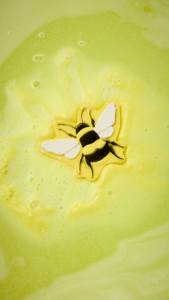
Lush Launches New Giving Product to Protect the Pollinators

LUSH has launched a limited edition bath bomb helping to protect pollinators, people and the planet from the impacts of highly hazardous pesticides. 75% of profits are going to support the ongoing campaign work of Pesticide Action Network UK (PAN UK), who are tackling the problems caused by pesticides like glyphosate.
Josie from PAN UK explains, “We all have an important role to play in protecting our precious pollinators. By ditching glyphosate and other harmful chemicals in our gardens and urban public spaces, we can create thriving habitats where both people and wildlife can flourish.”
Available now in shops, online and the Lush app in the UK & Ireland.
Pollinators are a diverse group of species including bees, wasps, butterflies, moths, flies and beetles that pollinate our food crops and wild plants and are critical to maintaining biodiversity and global food security.
Some foods such as apples, pears, almonds, cashews, blueberries and chocolate are completely dependent on pollinators.
In the UK, a recent State of Nature report shows pollinating insects have decreased in distribution by 18% since 1970, and almost 50% of wild bees and hoverflies have declined since 1980. Globally, populations of pollinators are threatened by the use of harmful pesticides, habitat losses, climate change and pollution.
Pesticides are causing overwhelming negative effects on hundreds of species of microorganisms, plants, insects, fish, birds and mammals that they are not intended to harm, and globally their use is a major contributor to the biodiversity crisis.
Glyphosate is the world’s most widely used herbicide, popular with farmers and available for the public to buy in garden centres and even some supermarkets. It’s sold as an effective weedkiller, and more commonly known by its original trade name Roundup.
In 2015, the International Agency for Research on Cancer (IARC) labelled glyphosate as “probably carcinogenic” and studies have found that glyphosate-based herbicides can interfere with various organs and biochemical pathways in mammals.Glyphosate based products have been shown to be toxic to bees and have adverse effects on earthworms and insects. Using glyphosate reduces plant and animal biodiversity as it kills the plants that provide habitats and food sources. When glyphosate enters the soil it reduces soil fertility by disrupting microbial balances and in rivers, lakes and oceans it has significant effects on aquatic organisms and ecosystems.
For further information or comment, please email lushpr@lush.co.uk.
About Pesticide Action Network UK:
PAN UK is a long running campaigning charity focused on tackling the problems caused by pesticides. They are part of a global network working to replace the use of highly hazardous pesticides with ecologically sound and socially just alternatives. They work tirelessly to apply pressure on governments, regulators, policy makers, industry and retailers to reduce the impacts of harmful pesticides to both human health and the environment.
About Lush:
Since establishing in 1995, Lush has been driven by innovation and its ethics. Creators of pioneering beauty products, one of Lush’s most well-known creations is the bath bomb.
Invented in 1989 by Lush Co-Founder Mo Constantine in her garden shed, bath bombs have become a global sensation – all hand pressed in Lush’s own manufacturing sites across the world, Lush sold over 21.2 million last year.
A beauty company with a campaigning heart, Lush is on a mission to create a product for every need and a cosmetic revolution to save the planet. The ultimate goal is to leave the world ‘Lusher than we found it’.
In August 2024, Lush reached £100 million in charitable giving, supporting grassroot organisations and activists through multiple programs since 2007. In FY23 Lush donated just under 1% of the company turnover to grassroots groups driving tangible positive impact, showing commitment to a long term giving strategy.
Today, Lush operates in 50 countries with over 850 shops, 38 websites shipping worldwide and a global network of native apps, broadcasting channels and digital communities in over 30 languages.
12:11